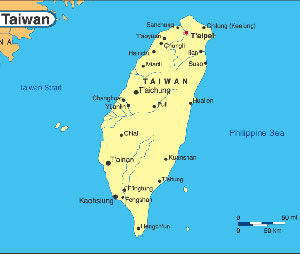Annual exploration spending will more than triple to NT$10 billion ($300 million) by 2010 from the NT$3 billion budgeted for this year, Wenent Pan said in an interview in Taipei. The portion used for overseas investments will rise to 80 percent from half now, he said.
Crude oil"s climb from $27 a barrel five years ago to more than $60 has forced CPC"s most aggressive push yet for overseas supplies. Taiwan has almost no oil and gas of its own and wells drilled jointly with China in the waters separating the political rivals have so far failed to produce any commercial discoveries.
``Higher oil prices encourage oil exploration,"" Pan said on May 9. ``If there"s an opportunity, we should go.""
The 62-year-old, who holds a doctoral degree in chemical engineering from the University of Wyoming, oversees a company that provides 75 percent of Taiwan"s gasoline and diesel needs and is the only gas supplier to Asia"s fifth-largest economy.
CPC"s fields overseas have proved oil and gas reserves equivalent to 92.8 million barrels of oil. That"s dwarfed by Cnooc Ltd., China"s largest offshore oil producer, which has reserves 27 times larger at 2.53 billion barrels. More than 80 percent of Cnooc"s reserves are offshore of China.
Import Bill
Taiwan"s oil-import bill rose to $23.5 billion last year, from $6.81 billion in 2001, according to the finance ministry.
CPC"s drive for overseas oil fields places it in growing competition with larger global rivals as asset prices rise and some nations tighten control over resources.
``The increasing cost and competition can be foreseen,"" Grace Liu, an analyst at Guotai Junan Securities Hong Kong Ltd., said by telephone today. ``Under so-called resource nationalism, even big companies have encountered difficulty acquiring assets abroad, as more and more countries start nationalizing oil assets.""
Multinationals now only have access to less than 10 percent of global oil resources, with the remainder controlled by state- owned oil companies, the Financial Times reported this week, citing a report by PFC Energy. Political causes are constraining capacity growth in Mexico, Venezuela, Iran, Iraq, Kuwait and Russia, the FT reported.
Chad, Libya
CPC gets money from the government"s Petroleum Fund for overseas purchases of oil and gas assets, said Y.L. Chen, secretary-general of the Bureau of Energy in Taipei. The fund, which has a budget of NT$4 billion for 2007, was set up in 2001 ``to help ensure petroleum supply,"" she said.
The state-run company is looking for investment targets in Africa, Southeast and Central Asia, and Latin America, said Pan, who has spent the last 25 years working at CPC and its subsidiary. Taiwan wants to break a reliance on shipments from the Middle East, source of 80 percent of the million barrels of crude the island buys each day.
``We evaluate around 20 possibilities every year,"" he said.
CPC has a contract with Chad"s government to explore for oil and gas in three areas and has been in talks with Nigeria for possible investment.
CPC plans to invest $39 million in a Libyan field over the next three years after winning rights to explore for oil and gas in the north African country, the company said in December. It won the rights to Murzuq 162, a 4,300 square-kilometer area with potential reserves of 500 million barrels of oil, giving the refiner its second African asset.
Government Priorities
Outside Africa, CPC has bought stakes in eight fields in Ecuador, Venezuela, Australia, Indonesia and the U.S. to ease dependence on supplies from Saudi Arabia, Kuwait and Iran.
``The government"s national and economic development divisions place a lot of importance on energy supply,"" said Yang Feng-shuo, director of energy studies at Taiwan Institute of Economic Research in Taipei. ``CPC has been forced to seek oil fields.""
CPC imports more than 99 percent of its oil and buys about 95 percent of its natural gas needs overseas in the form of liquefied natural gas.
LNG is natural gas that has been chilled to liquid form, reducing it to one-six-hundredth of its original volume at minus 161 degrees Celsius (minus 259 Fahrenheit), for transportation by ship to destinations not connected by pipeline. On arrival, it"s turned back into gas for distribution to power plants, factories and households.
In the Taiwan Strait, the waters separating the island from China, CPC is developing a field that has an estimated 6 billion cubic meters of natural gas, the company said in January 2005. Production is slated to start in 2010.
Tainan Basin
The state-run oil refiner and Beijing-based China National Offshore Oil Corp., the parent of Cnooc, are jointly searching for oil and gas in the Tainan Basin off southern China.
The partners are planning to drill their second exploration well, after what they found in the first turned out to be ``not big enough for development,"" Pan said.
CPC is willing to work with China"s state companies in the South China Sea, he said.
Taiwan and China have been administered separately since a civil war ended in 1949. The government in Beijing considers the island part its territory that must be united, by force if needed.
``We have good contacts with Chinese oil companies,"" Pan said.
PIN/BLOOMBERG


Your Comment